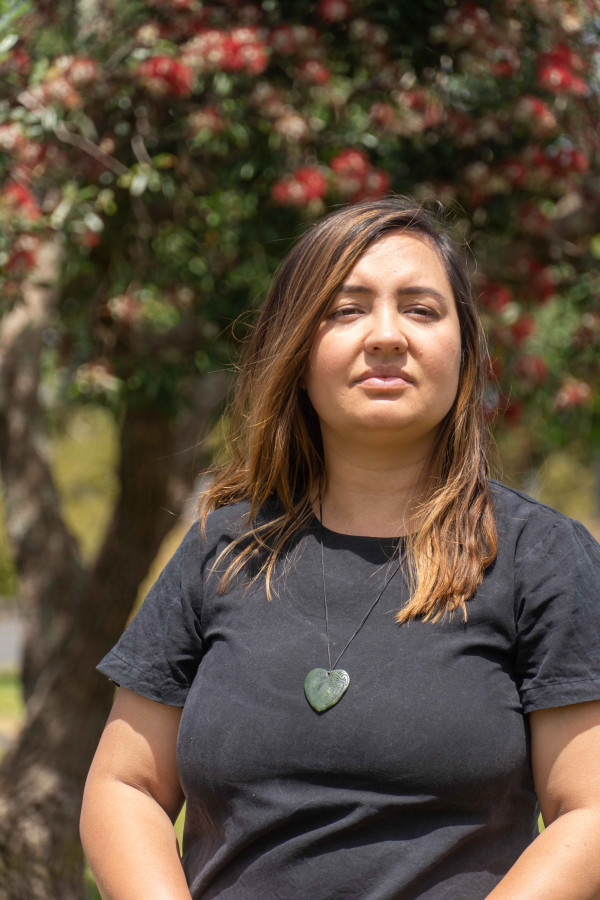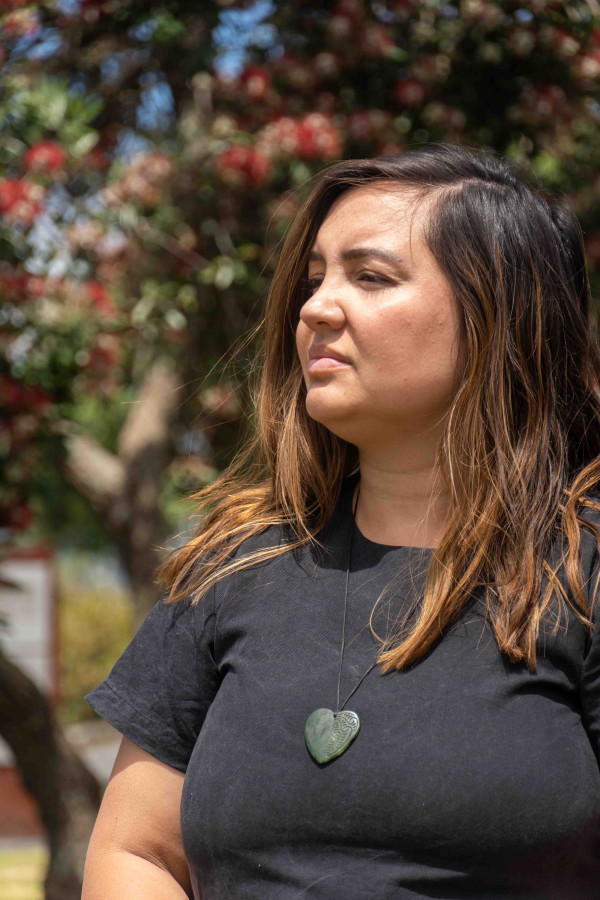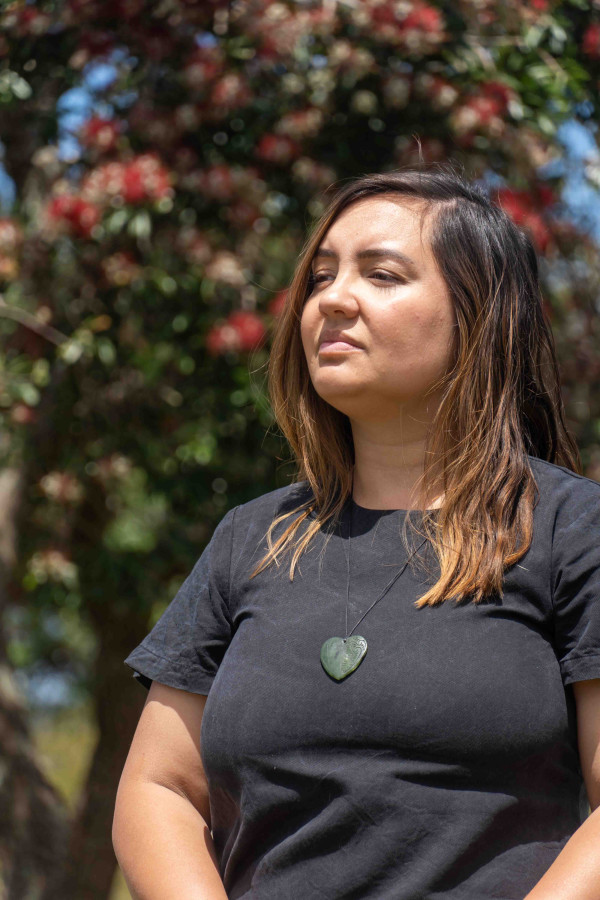Content warning: This article discusses miscarriage and blood.
I was working from home when I noticed the faint drops of brown blood. Pregnant, I didn’t know if spotting was good or bad.
I googled and got conflicting information, so I texted my midwife. She immediately called me back. I had an appointment with her that day, which I’d forgotten about. She told me to come in.
When I arrived, I did a pee test, which returned a not-good result colour. Even so, the midwife remained her cheerful self.
I lay down while she attempted for a long time to find the baby’s heartbeat. She couldn’t. But possibly not wanting to upset me, reassured that it’s often hard to find the heartbeat this early on.
I was scheduled for an urgent ultrasound.
I felt sick to my stomach and shaky. I didn’t know much, if anything, about the possibility of being pregnant and not having a baby at the end of it.
No one had ever spoken to me about their experiences of miscarriage or even mentioned it as something that can happen. If you’re pregnant, you have a baby. That was what I thought.
*
My partner and his family were away, competing at Iron Māori, and I'd decided not to go with them because of how tired I was with the pregnancy. My own family lives on the other side of the North Island.
I went to the ultrasound appointment by myself.
I climbed onto the bed, my bladder full. The technician placed the jelly on my stomach and pressed down on the ultrasound instrument. I didn’t watch the black-and-white fuzzy screen because I didn’t know what I was looking at and was scared it would be bad news.
It wasn’t long before she was finished.
With a measured voice, she told me there was no baby.
It looked like the pregnancy had terminated as a mass of cells around five weeks. Yet my body had carried on as if it was pregnant — a missed miscarriage.
The spotting I was experiencing was the beginning of that miscarriage.
I cried in the X-ray room.
The technician took me through the back door, so I didn’t have to see anyone.
I went straight to my car and called my partner. He cried, too. We didn’t know this could happen and were unprepared for this outcome.
I felt guilty, as though my body had failed us, had failed the baby, though I know that’s not how it works.
I couldn’t stop the thoughts that went through my head. Maybe it was that coffee I had a week ago. Maybe I’m infertile.
*
The midwife rang me when I got home.
She sounded concerned and urged me to inform someone.

"The loss of a pregnancy is the loss of a dream," writes Ataria Sharman. Photo credit: Te Piha Niha, NGEN Media
The problem was we’d been waiting until 12 weeks to tell people, so no one knew we were pregnant.
It felt wrong to call my family to share the sad news: I was having a miscarriage, and they didn’t even know we were pregnant in the first place.
Whenever I’m sick, I turn the futon couch in our lounge into a bed. I pulled all the pillows and blankets off our Super King, made the lounge bed, and binge-watched episodes of Merlin, an old-school fantasy series about King Arthur and his wizard friend. Our dog and cat joined me.
I ordered takeout and didn’t talk to anyone. I had a shower, sat on the shower floor, and cried.
*
The day after, my partner nearly died at Iron Māori. He forgot to get a layer of water into his wetsuit before the swim, so it was too tight on his body, and he could barely move his arms or breathe. Although he’s an experienced surf lifesaver and strong swimmer, he used all of his strength just to finish the race, and at one point, he thought he wouldn’t make it.
*
The spotting continued for weeks.
One evening, I felt a griping, rolling pain that would come and leave again. I knew what was happening. I alternated between crying while sitting on the toilet and changing pads for all the blood.
My partner did his best to support me. After stirring the vegetable soup he was making to comfort me, he’d run down to the toilet and our bedroom and rub my back.
I sobbed into the duvet as I knelt on a yoga bolster on the edge of the bed.
I didn’t mind the pain if there was a baby at the end.
But pain and no baby. That’s just sad.
*
We tried to call the midwife when the bleeding got out of control, but she didn’t pick up, so we rang the ambulance. The operator at the end of the emergency call told me to lie on a towel, I did until the ambulance arrived to take me to the hospital.
When I was lying in the hospital bed, we finally rang and told our mothers. I think it was because we were so scared and traumatised at that point we realised we needed their support.
*
Walking on a paved overbridge to Darling Harbour, Sydney, I felt a stickiness between my thighs. I ignored it for a bit until I couldn’t ignore it anymore. I was on my way to a Lego exhibition of all places.
My sister and I had caught the tram from The Rocks in colourful summer dresses. I stopped and discreetly pulled up my skirt. There was blood, lots of it. It had soaked through my undies, and threads ran down my legs.
I felt a panicked tightening in my chest.
It wasn’t that time of the month, and we had no pads or tampons. If I quickly found a pharmacy and toilet and secured wet wipes and super pads, I thought we might still see the Lego exhibition in all its glory.
From a trip years ago, I remembered a mall on the other side of the harbour. I waddled awkwardly in that direction, my sticky legs rubbing against each other.
But we realised too late it was no longer open. The pandemic and a slowdown in tourism meant all that was left were a mass of construction cones and ‘warning do not enter’ tape decorating what once was the mall.
The tantalising pharmacy sat empty and shut.

After talking about her miscarriage, other people have privately shared with Ataria Sharman their experiences of miscarriage. Photo credit: Te Piha Niha, NGEN Media
My sister Google Mapped the nearest pharmacy, which was a kilometre away. There, I bought pads and wipes and duck-walked into the toilet of a busy pub, rip-roaring with men watching the rugby. My sister bought us soft drinks, and I cleaned myself up.
Blood had soaked through my dress. My sister booked an Uber, and I sat above the seat, anxious I might soil the car. It felt good when I made it to the safety of the hotel shower. Lego would wait for another day.
*
I later learned this bleeding was a continuation of the miscarriage, even though it was months after.
*
After having a miscarriage and talking about it, quite a few women privately shared with me they’d had a miscarriage, too, and some more than one.
According to research by the University of Auckland’s School of Population Health, almost one in three New Zealand women has experienced at least one miscarriage.
This is too high for something we don’t discuss in our communities, whānau, or even with other women.
I think what was traumatic about this experience was not so much the miscarriage itself, which often happens for natural reasons, but that we were unprepared because no one had ever talked to us about it.
The other reason is there wasn’t immediate family support for us at a time of grieving because no one knew we were pregnant.
*
My GP offered me a 15-minute counselling session with a nurse a few days later, which I gratefully accepted. Then, she was sick that day, and the earliest my appointment could be rescheduled was weeks later.

Ataria Sharman hopes there will be more support for parents who have had a miscarriage and it's talked about more openly. Photo credit: hoto credit: Te Piha Niha, NGEN Media
I was gutted because I needed to see someone that week, not in weeks. I never ended up talking to a mental health professional about the miscarriage.
Charity Miscarriage Matters, and Sands New Zealand - a volunteer and parent-run organisation, support parents. Miscarriage Matters provides care packages in Canterbury, the West Coast, Wellington and parts of Auckland, but not in Whangārei, where I live.
The loss of a pregnancy is the loss of a dream. It’s the loss of a future you and your partner imagined and envisioned together.
I hope one day, there will be more support for parents who’ve had a miscarriage and that it’s talked about more openly.
Photos of Ataria Sharman by Te Piha Niha, NGEN Media.
Ataria Sharman (Tapuika, Ngāpuhi) was born in Te Whanganui-a-Tara; she now lives in Hikurangi, Te Tai Tokerau. Ataria has a Master of Arts and spent a year researching mana wahine and atua wāhine. Her first novel Hine and the Tohunga Portal by Huia Publishers, was a finalist in the 2022 New Zealand Book Awards for Youth and Children.
Where to get help:
- 1737: The nationwide, 24/7 mental health support line. Call or text 1737 to speak to a trained counsellor.
- Suicide Crisis Line: Free call 0508 TAUTOKO or 0508 828 865. Nationwide 24/7 support line operated by experienced counsellors with advanced suicide prevention training.
- Youthline: Free call 0800 376 633, free text 234. Nationwide service focused on supporting young people.
- OUTLine NZ: Freephone 0800 OUTLINE (0800 688 5463). National service that helps LGBTIQ+ New Zealanders access support, information and a sense of community.
- Sands New Zealand is a network of parent-run, non-profit groups supporting families who have experienced the death of a baby.
- Miscarriage Matters improves the experience of miscarriage in New Zealand by empowering people with information, advocacy and support.
More stories:
How colonisation has changed the naked body
"If I raise a daughter, I'm hopeful about the world she will live in as a Māori woman."
Reclaiming my reo is scary. Here’s how I’m pushing through
"It takes doing it in real life, not just in my head, and that’s hard."
‘Infertility doesn’t discriminate’: 26-year-old shares IVF journey
“Only on an IVF journey do you get excited about having good eggs”.